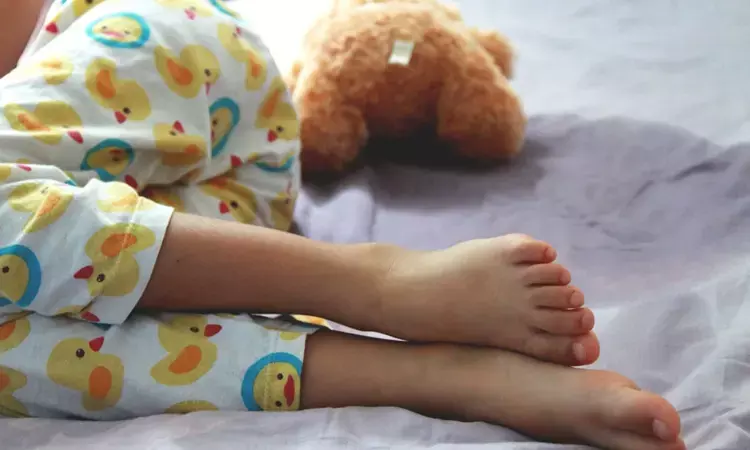- Home
- Medical news & Guidelines
- Anesthesiology
- Cardiology and CTVS
- Critical Care
- Dentistry
- Dermatology
- Diabetes and Endocrinology
- ENT
- Gastroenterology
- Medicine
- Nephrology
- Neurology
- Obstretics-Gynaecology
- Oncology
- Ophthalmology
- Orthopaedics
- Pediatrics-Neonatology
- Psychiatry
- Pulmonology
- Radiology
- Surgery
- Urology
- Laboratory Medicine
- Diet
- Nursing
- Paramedical
- Physiotherapy
- Health news
- Fact Check
- Bone Health Fact Check
- Brain Health Fact Check
- Cancer Related Fact Check
- Child Care Fact Check
- Dental and oral health fact check
- Diabetes and metabolic health fact check
- Diet and Nutrition Fact Check
- Eye and ENT Care Fact Check
- Fitness fact check
- Gut health fact check
- Heart health fact check
- Kidney health fact check
- Medical education fact check
- Men's health fact check
- Respiratory fact check
- Skin and hair care fact check
- Vaccine and Immunization fact check
- Women's health fact check
- AYUSH
- State News
- Andaman and Nicobar Islands
- Andhra Pradesh
- Arunachal Pradesh
- Assam
- Bihar
- Chandigarh
- Chattisgarh
- Dadra and Nagar Haveli
- Daman and Diu
- Delhi
- Goa
- Gujarat
- Haryana
- Himachal Pradesh
- Jammu & Kashmir
- Jharkhand
- Karnataka
- Kerala
- Ladakh
- Lakshadweep
- Madhya Pradesh
- Maharashtra
- Manipur
- Meghalaya
- Mizoram
- Nagaland
- Odisha
- Puducherry
- Punjab
- Rajasthan
- Sikkim
- Tamil Nadu
- Telangana
- Tripura
- Uttar Pradesh
- Uttrakhand
- West Bengal
- Medical Education
- Industry
Fluoxetine benefits patients of refractory monosymptomatic nocturnal enuresis

EGYPT: For children and adolescents with refractory primary monosymptomatic nocturnal enuresis (PMNE), fluoxetine therapy, a selective serotonin reuptake inhibitor, is a safe therapeutic option that produces an initial positive response. A study that appeared in the Journal of Urology found that the response rate does, however, gradually decline with time.
15% of children over the age of 5 experience nocturnal enuresis (NE), a serious health issue. Even though it has been shown that 15% of cases resolve spontaneously each year, 2% to 6% of adults and 1% to 2% of teenagers older than 15 still struggle with this problem.
The effectiveness and safety of fluoxetine, a selective serotonin reuptake inhibitor, in the treatment of refractory primary monosymptomatic nocturnal enuresis in children were studied by the researchers.
Pediatric patients with severe primary monosymptomatic nocturnal enuresis (PMNE) who were resistant to alarm therapy, desmopressin, and anticholinergics were included in the study. They ranged in age from 8 to 18 years. Participants were randomly and equally assigned to receive 10-mg of fluoxetine once day or a placebo for 12 weeks after eliminating children with daytime urine symptoms, constipation, or underlying urological, neuropsychiatric, endocrinologic, or cardiac disorders. A total of 150 pediatric patients were enrolled, 110 of whom were examined, with an average age of 11.8 (SD 2.46) years (56 in the fluoxetine group and 54 in the placebo group).
According to the International Children's Continence Society terminology, the main result was treatment response. Adverse treatment-related effects and night-time arousal were the secondary outcomes.
Key findings of the study:
- After 4 weeks, the fluoxetine group had a complete response rate of 7.1% and a partial response rate of 66.1% (defined as a 50%-99% reduction in the number of wet nights), compared to the placebo group's 0% and 16.7% (P .001).
- At 12 weeks, the fluoxetine group experienced complete and partial responses in 10.7% and 21.4% of the cases, respectively (vs 0% and 14.8% in the placebo group, P =.023).
- Patients using fluoxetine experienced fewer wet nights (4.7 [SD 4.2] fortnightly vs 9.7 [SD 3.5] at 4 weeks; 5.7 [SD 4.4] vs 9.9 [SD 3.4] at 8 weeks; 7.5 [SD 4.6] vs 9.9 [SD 3.4] at 12 weeks.
- Fluoxetine was linked to increased nocturnal arousal (P =.017), as well as modest and quickly reversed side effects in 5 (8.9%) patients.
- The AEs were all quickly reversible and included two occurrences of headache/dizziness, one case each of hypersensitivity/skin rash, hair loss, exhaustion, low mood, and anxiety.
"We believe that this pilot study will encourage more research to verify the safety and efficacy of fluoxetine for the treatment of PMNE, compare it to other conventional therapies for NE, and explore its use in different patient groups and other forms of childhood incontinence," the authors wrote in their conclusion.
REFERENCE
Hussiny M, Hashem A, Soltan MA, Helmy TE, El-Kenawy MR, Abdelhalim A. The Safety and Efficacy of Fluoxetine for the Treatment of Refractory Primary Monosymptomatic Nocturnal Enuresis in Children: A Randomized Placebo-Controlled Trial. J Urol. 2022 Nov;208(5):1126-1134. doi: 10.1097/JU.0000000000002896. Epub 2022 Aug 31. PMID: 36043350.
Dr Kamal Kant Kohli-MBBS, DTCD- a chest specialist with more than 30 years of practice and a flair for writing clinical articles, Dr Kamal Kant Kohli joined Medical Dialogues as a Chief Editor of Medical News. Besides writing articles, as an editor, he proofreads and verifies all the medical content published on Medical Dialogues including those coming from journals, studies,medical conferences,guidelines etc. Email: drkohli@medicaldialogues.in. Contact no. 011-43720751


